- Author Jason Gerald gerald@how-what-advice.com.
- Public 2023-12-16 10:50.
- Last modified 2025-01-23 12:04.
We already know that quitting smoking is a very good choice for health. However, during the first few weeks after quitting smoking, you may experience certain symptoms, such as chest congestion. You may be coughing, feel tight or have mucus in your chest, and have a slightly hoarse voice. Although uncomfortable at first, chest congestion indicates that your body is starting to repair and recover from the smoking habit.
Step
Method 1 of 3: Dealing with Chest Congestion in the Short Term
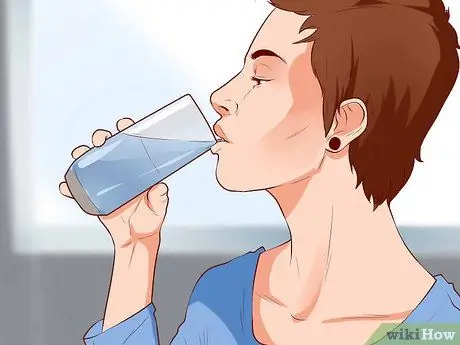
Step 1. Drink plenty of fluids, especially water
Water will help the body deal with congestion by thinning the mucus in the lungs and making it easier to expel mucus. Fluids also keep the body hydrated.
- Tobacco smoking slows the movement of the fine hairs (called cilia) that line the lungs and help expel mucus. When you quit smoking, these hairs become more active and begin to clear mucus that has built up in the lungs. However, it can cause coughing for several weeks after you start smoking.
- Orange juice and other natural fruit juices provide the vitamins and minerals your body needs to deal with congestion.
- As much as possible avoid alcohol, coffee, and soda which can cause dehydration.

Step 2. Take a hot shower once or twice a day
Dry air can irritate the lungs and make coughing worse. Meanwhile, the steam generated from hot water can moisten the airways in the lungs and thin mucus.
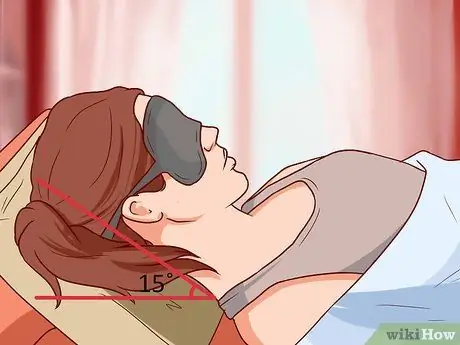
Step 3. Sleep with your head elevated
Position your head at a 15-degree angle by placing a pillow or two under your head. This position will minimize the rise of mucus into the throat that can cause coughing at night.
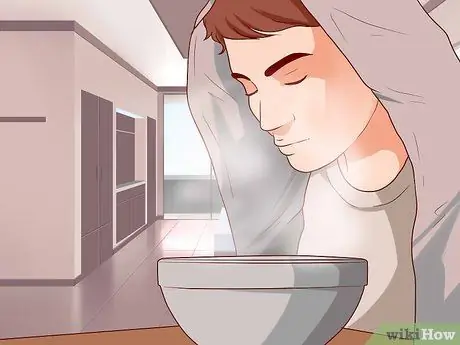
Step 4. Try steaming your face
Steaming your face produces the same effect as taking a shower, by directing steam from hot water directly into your airways and lungs. Pour six cups of hot (almost boiling) water into a bowl. Cover the head with a towel. Position your nose and mouth over the bowl and take a deep breath.
- Add three to four drops of eucalyptus oil to the water. Eucalyptus oil has antibacterial and analgesic properties and acts as an expectorant, releasing phlegm that causes coughing.
- Add a few drops of peppermint oil to a bowl for the cooling benefits of menthol.
- You can also use a professional facial steamer available at pharmacies or drugstores.
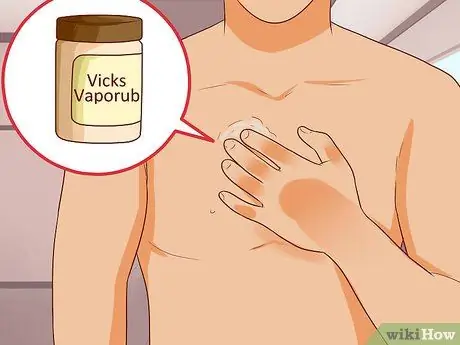
Step 5. Apply balm
Balsams, such as Vicks Vaporub, can help relieve chest congestion due to their menthol (active agent in peppermint). Menthol can relieve feelings of shortness of breath. While the benefits are psychological, they help relieve the symptoms (but not the cause) of chest congestion.
Never apply rubbing balm directly under the nose or on infants or children under 2 years of age. Camphor, which is the active ingredient in many rubbing balms, is toxic if swallowed or inhaled
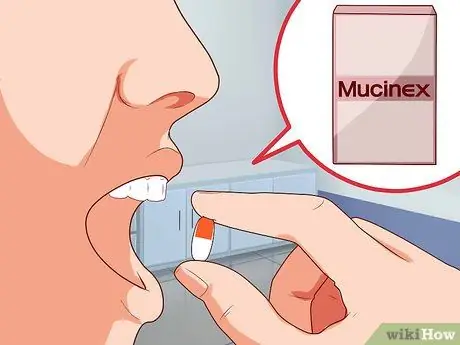
Step 6. Drink Mucinex
If you don't mind taking medication, Mucinex can help reduce any chest congestion you may be suffering from. These drugs thin and release mucus in the airways, clear congestion, and make breathing easier.
Mucinex is designed as a temporary solution to relieve congestion and flu-like symptoms. You should consult a doctor before using it to treat congestion or cough due to smoking
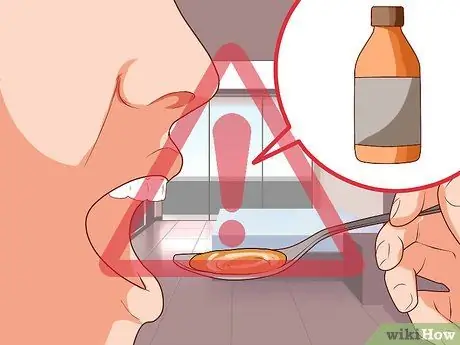
Step 7. Avoid cough medicine
Coughing will help release phlegm from the lungs and help with chest congestion. Let your body cough and avoid over-the-counter cough medicines.
Method 2 of 3: Reducing Chest Congestion in the Long Term
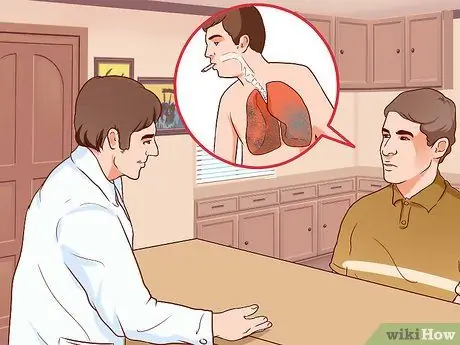
Step 1. Consult a doctor for “smoker's lung” treatment
Although congestion is normal for the first few weeks after quitting smoking, be aware that smoking increases your risk of "smoker's lung". "Smoker's lung" is an umbrella term for chronic bronchitis and chronic constructive lung disease associated with reduced airflow due to lung damage. Both conditions are associated with coughing and shortness of breath.
- People who have smoker's lung experience a combination of symptoms similar to chronic bronchitis and emphysema. Symptoms include coughing, shortness of breath, and mucus in the lungs.
- Although treatment for both conditions is minor, you should talk to your doctor about the possibility of experiencing them after quitting smoking.
- Your doctor may order a chest X-ray or CT scan to make sure there are no other possibilities.
- Lung function tests or blood tests may also be needed to determine other contributors to your condition.
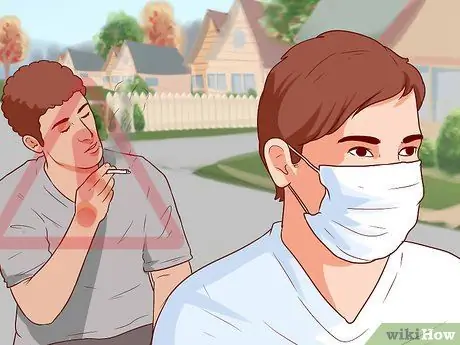
Step 2. Avoid exposure to cigarettes or secondhand smoke
You should also wear a mask when working with strong-smelling objects such as paint or strong-smelling household cleaners.
- If possible, do not leave the house if you are polluted.
- Stay away from wood stoves and heaters that use oil, which can also give off smoke or a strong odor.
- If the cold makes your cough worse, wear a mask before leaving the house, especially in the colder months.
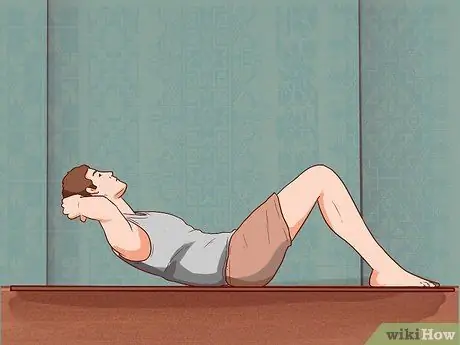
Step 3. Exercise regularly
The function of the lungs and cardiovascular system must always be maintained. Your body has started the repair process right after smoking cessation. The more you exercise, especially after quitting smoking, the greater the ability of your lungs to regain the capacity they lost when you smoked.
Studies examining the effects of quitting smoking found some physical improvement after one week. Eleven young men who had smoked about a pack a day for three and a half years underwent several tests while on a stationary bike before quitting, and one week later. The study showed an increase in the concentration of oxygen in the lungs and an extension of exercise time

Step 4. Purchase a humidifier such as a humidifier or vaporizer
Putting a humidifier or vaporizer in your room while you sleep can help keep your body hydrated at night and also help release mucus. Keep the humidifer filter clean to minimize the amount of dust in the air that causes congestion.
Keep the vaporizer and humidifier clean. Every two or three days, clean the filter using chlorine and water (two tablespoons of chlorine per liter of water). Run the engine to dry (about 40 minutes) in a well-ventilated area, away from bedrooms
Method 3 of 3: Soothes Throat and Chest due to Congestion
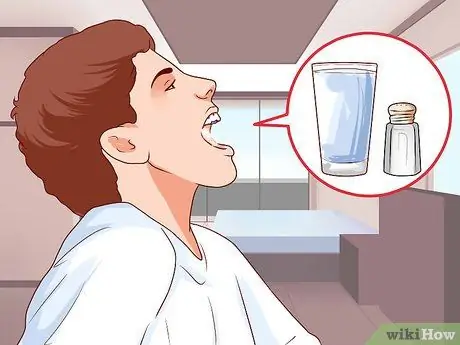
Step 1. Gargle with salt water
Coughing caused by chest congestion can make the throat itchy or sore. The saline solution can draw excess fluid from the inflamed tissue in the throat and temporarily soothe it.
Dissolve to tsp. salt in 250 ml of warm (not too hot) water. Gargle for 15-20 seconds, then spit it out

Step 2. Drink warm lemon juice and honey
The combination of honey and lemon can soothe the throat and help relieve chest congestion. Add honey and lemon juice to hot water, or drink a teaspoon of honey to soothe your throat.
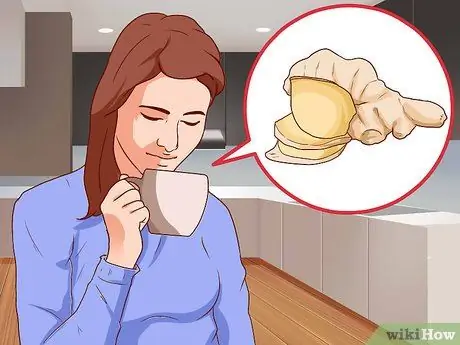
Step 3. Add ginger in your diet
Ginger is a natural antidote to inflammation and can soothe irritated lungs. Drink ginger water and add ginger root (not crystallized ginger) to recipes like soups and stir-fries. You can also try ginger candy to suppress coughs.
To make ginger water, cut the ginger root into the size of a thumb and boil it in hot water for about 15 minutes. Add a little honey to add properties to the throat and chest

Step 4. Drink peppermint tea
Just like ginger, peppermint is a natural expectorant and can help thin mucus and break up phlegm. The main active agent, menthol, is a good decongestant and is found in a number of over-the-counter medications for chest congestion.
Drinking peppermint tea daily can help relieve the underlying symptoms of chest congestion
Tips
- Keep in mind that you may also experience other side effects after quitting smoking, such as weight gain due to increased hunger, anxiety, depression, sore throat, and/or thrush. Talk to your doctor if the side effects of quitting smoking are interfering with your daily life.
- Do not take over-the-counter cough suppressants without your doctor's permission.
- Talk to your doctor if your flu-like symptoms last longer than a month after quitting smoking, or if you bleed when you cough.
- A chronic cough or mucus production for at least three weeks may be a sign of chronic bronchitis, which is a chronic inflammatory condition of the lungs caused by swelling and irritation in the respiratory tract. If you experience any of these symptoms, see your doctor for a diagnosis.






